苏教版初一下英语复习资料
- 格式:doc
- 大小:26.00 KB
- 文档页数:4
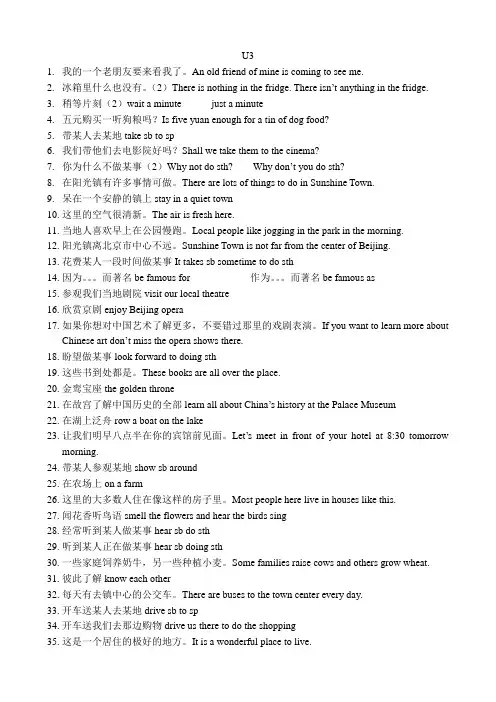
U31.我的一个老朋友要来看我了。
An old friend of mine is coming to see me.2.冰箱里什么也没有。
(2)There is nothing in the fridge. There isn’t anything in the fridge.3.稍等片刻(2)wait a minute just a minute4.五元购买一听狗粮吗?Is five yuan enough for a tin of dog food?5.带某人去某地take sb to sp6.我们带他们去电影院好吗?Shall we take them to the cinema?7.你为什么不做某事(2)Why not do sth? Why don’t you do sth?8.在阳光镇有许多事情可做。
There are lots of things to do in Sunshine Town.9.呆在一个安静的镇上stay in a quiet town10.这里的空气很清新。
The air is fresh here.11.当地人喜欢早上在公园慢跑。
Local people like jogging in the park in the morning.12.阳光镇离北京市中心不远。
Sunshine Town is not far from the center of Beijing.13.花费某人一段时间做某事It takes sb sometime to do sth14.因为。
而著名be famous for 作为。
而著名be famous as15.参观我们当地剧院visit our local theatre16.欣赏京剧enjoy Beijing opera17.如果你想对中国艺术了解更多,不要错过那里的戏剧表演。
If you want to learn more aboutChinese art don’t miss the opera shows there.18.盼望做某事look forward to doing sth19.这些书到处都是。
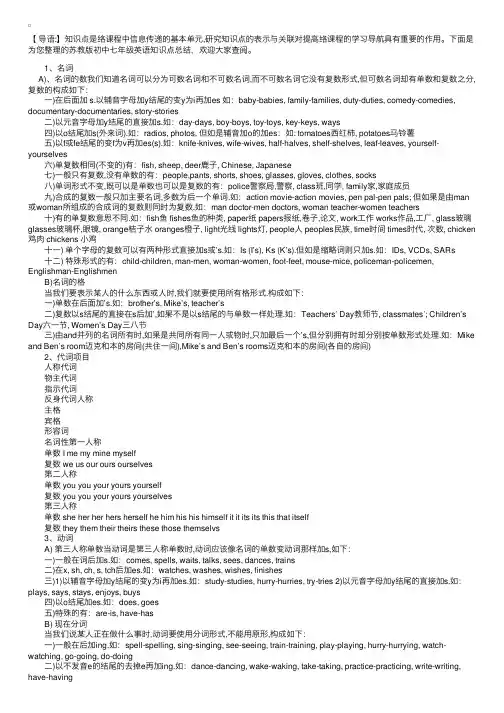
【导语:】知识点是络课程中信息传递的基本单元,研究知识点的表⽰与关联对提⾼络课程的学习导航具有重要的作⽤。
下⾯是为您整理的苏教版初中七年级英语知识点总结,欢迎⼤家查阅。
1、名词 A)、名词的数我们知道名词可以分为可数名词和不可数名词,⽽不可数名词它没有复数形式,但可数名词却有单数和复数之分,复数的构成如下: ⼀)在后⾯加 s.以辅⾳字母加y结尾的变y为i再加es 如:baby-babies, family-families, duty-duties, comedy-comedies, documentary-documentaries, story-stories ⼆)以元⾳字母加y结尾的直接加s.如:day-days, boy-boys, toy-toys, key-keys, ways 四)以o结尾加s(外来词).如:radios, photos, 但如是辅⾳加o的加es:如: tomatoes西红柿, potatoes马铃薯 五)以f或fe结尾的变f为v再加es(s).如:knife-knives, wife-wives, half-halves, shelf-shelves, leaf-leaves, yourself-yourselves 六)单复数相同(不变的)有:fish, sheep, deer⿅⼦, Chinese, Japanese 七)⼀般只有复数,没有单数的有:people,pants, shorts, shoes, glasses, gloves, clothes, socks ⼋)单词形式不变,既可以是单数也可以是复数的有:police警察局,警察, class班,同学, family家,家庭成员 九)合成的复数⼀般只加主要名词,多数为后⼀个单词.如:action movie-action movies, pen pal-pen pals; 但如果是由man 或woman所组成的合成词的复数则同时为复数.如:man doctor-men doctors, woman teacher-women teachers ⼗)有的单复数意思不同.如:fish鱼 fishes鱼的种类, paper纸 papers报纸,卷⼦,论⽂, work⼯作 works作品,⼯⼚, glass玻璃glasses玻璃杯,眼镜, orange桔⼦⽔ oranges橙⼦, light光线 lights灯, people⼈ peoples民族, time时间 times时代, 次数, chicken 鸡⾁ chickens ⼩鸡 ⼗⼀) 单个字母的复数可以有两种形式直接加s或’s.如:Is (I’s), Ks (K’s).但如是缩略词则只加s.如:IDs, VCDs, SARs ⼗⼆) 特殊形式的有:child-children, man-men, woman-women, foot-feet, mouse-mice, policeman-policemen, Englishman-Englishmen B)名词的格 当我们要表⽰某⼈的什么东西或⼈时,我们就要使⽤所有格形式.构成如下: ⼀)单数在后⾯加’s.如:brother’s, Mike’s, teacher’s ⼆)复数以s结尾的直接在s后加’,如果不是以s结尾的与单数⼀样处理.如:Teachers’ Day教师节, classmates’; Children’s Day六⼀节, Women’s Day三⼋节 三)由and并列的名词所有时,如果是共同所有同⼀⼈或物时,只加最后⼀个’s,但分别拥有时却分别按单数形式处理.如:Mike and Ben’s room迈克和本的房间(共住⼀间),Mike’s and Ben’s rooms迈克和本的房间(各⾃的房间) 2、代词项⽬ ⼈称代词 物主代词 指⽰代词 反⾝代词⼈称 主格 宾格 形容词 名词性第⼀⼈称 单数 I me my mine myself 复数 we us our ours ourselves 第⼆⼈称 单数 you you your yours yourself 复数 you you your yours yourselves 第三⼈称 单数 she her her hers herself he him his his himself it it its its this that itself 复数 they them their theirs these those themselvs 3、动词 A) 第三⼈称单数当动词是第三⼈称单数时,动词应该像名词的单数变动词那样加s,如下: ⼀)⼀般在词后加s.如:comes, spells, waits, talks, sees, dances, trains ⼆)在x, sh, ch, s, tch后加es.如:watches, washes, wishes, finishes 三)1)以辅⾳字母加y结尾的变y为i再加es.如:study-studies, hurry-hurries, try-tries 2)以元⾳字母加y结尾的直接加s.如:plays, says, stays, enjoys, buys 四)以o结尾加es.如:does, goes 五)特殊的有:are-is, have-has B) 现在分词 当我们说某⼈正在做什么事时,动词要使⽤分词形式,不能⽤原形,构成如下: ⼀)⼀般在后加ing.如:spell-spelling, sing-singing, see-seeing, train-training, play-playing, hurry-hurrying, watch-watching, go-going, do-doing ⼆)以不发⾳e的结尾的去掉e再加ing.如:dance-dancing, wake-waking, take-taking, practice-practicing, write-writing, have-having 三)以重读闭⾳节结尾且⼀个元⾳字母+⼀个辅⾳字母(注意除开字母组合如show –showing, draw-drawing)要双写最后的辅⾳字母再加ing.如:put-putting, run-running, get-getting, let-letting, begin-beginning 四)以ie结尾的变ie为y再加ing.如:tie-tying系 die-dying死 lie-lying 位于 4、形容词的级 我们在对两个或以上的⼈或物进⾏对⽐时,则要使⽤⽐较或级形式.构成如下: ⼀) ⼀般在词后加er或est(如果是以e结尾则直接加r或st).如:greater-greatest, shorter –shortest, taller –tallest, longer –longest, nicer- nicest, larger -largest ⼆)以重读闭⾳节结尾且1个元⾳字母+1个辅⾳字母(字母组合除外,如few-fewer fewest)结尾的双写结尾的辅⾳再加er /est.如:big-bigger biggest, red-redder reddest, hot-hotter hottest 三) 以辅⾳字母+y结尾的变y为i加er/est.如:happy-happier happiest, sorry-sorrier sorriest, friendly-friendlierfriendliest(more friendly most friendly), busy-busier busiest, easy-easier easiest 四)特殊情况:(两好多坏,⼀少⽼远) good/well-better best,many/much-more most,bad/ill-worse worst,little-less least,old-older/elder oldest/eldest,far-farther/further farthest/furthest 5、数词 (基变序,有规则;⼀、⼆、三,⾃⼰背;五、⼋、九、⼗⼆;其它后接th;y结尾,变为i, eth跟上去.) first, second, third; fifth, eighth, ninth, twelfth; seventh, tenth, thirteenth, hundredth; twenty-twentieth, forty-fortieth, ninety-ninetieth。
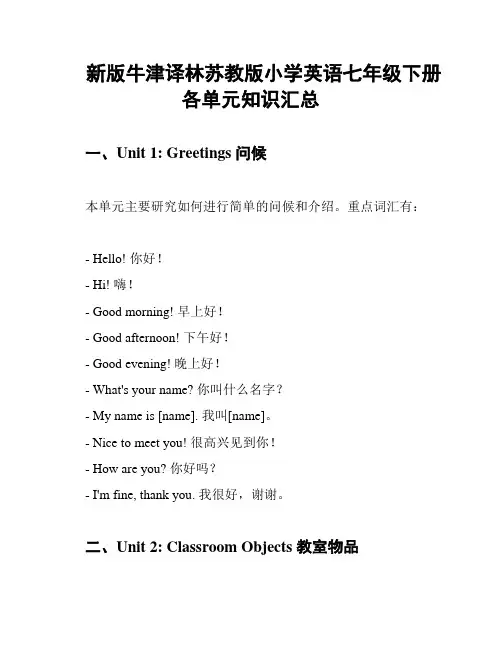
新版牛津译林苏教版小学英语七年级下册各单元知识汇总一、Unit 1: Greetings 问候本单元主要研究如何进行简单的问候和介绍。
重点词汇有:- Hello! 你好!- Hi! 嗨!- Good morning! 早上好!- Good afternoon! 下午好!- Good evening! 晚上好!- What's your name? 你叫什么名字?- My name is [name]. 我叫[name]。
- Nice to meet you! 很高兴见到你!- How are you? 你好吗?- I'm fine, thank you. 我很好,谢谢。
二、Unit 2: Classroom Objects 教室物品本单元主要研究教室里常见的物品。
重点词汇有:- desk 课桌- chair 椅子- book 书- pen 笔- pencil 铅笔- ruler 尺子- eraser 橡皮擦- bag 书包- notebook 笔记本- blackboard 黑板三、Unit 3: Numbers 数字本单元主要研究基本的数字表达。
重点词汇有:- one 一- two 二- three 三- four 四- five 五- six 六- seven 七- eight 八- nine 九- ten 十四、Unit 4: Family 家庭本单元主要研究家庭成员的称呼。
重点词汇有:- father 父亲- mother 母亲- brother 兄弟- sister 姐妹- grandfather 爷爷- grandmother 奶奶- aunt 阿姨- uncle 叔叔- cousin 堂兄弟/堂姐妹五、Unit 5: Colors 颜色本单元主要研究颜色的表达。
重点词汇有:- red 红色- blue 蓝色- yellow 黄色- green 绿色- orange 橙色- purple 紫色- black 黑色- white 白色- pink 粉色- brown 棕色六、Unit 6: Weather 天气本单元主要研究天气的描述。
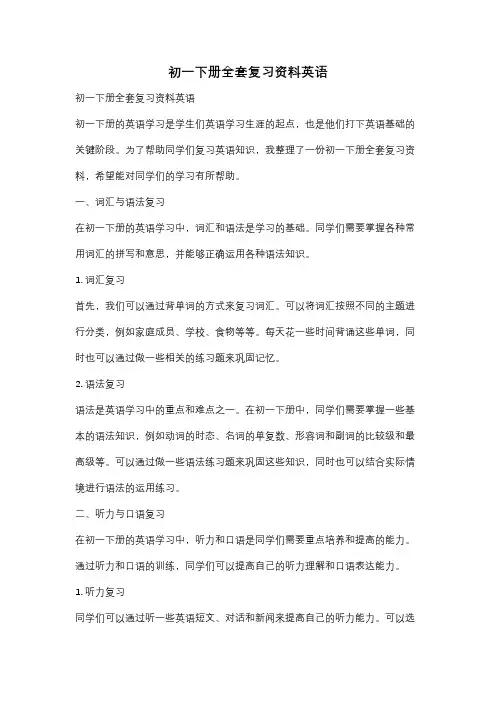
初一下册全套复习资料英语初一下册全套复习资料英语初一下册的英语学习是学生们英语学习生涯的起点,也是他们打下英语基础的关键阶段。
为了帮助同学们复习英语知识,我整理了一份初一下册全套复习资料,希望能对同学们的学习有所帮助。
一、词汇与语法复习在初一下册的英语学习中,词汇和语法是学习的基础。
同学们需要掌握各种常用词汇的拼写和意思,并能够正确运用各种语法知识。
1. 词汇复习首先,我们可以通过背单词的方式来复习词汇。
可以将词汇按照不同的主题进行分类,例如家庭成员、学校、食物等等。
每天花一些时间背诵这些单词,同时也可以通过做一些相关的练习题来巩固记忆。
2. 语法复习语法是英语学习中的重点和难点之一。
在初一下册中,同学们需要掌握一些基本的语法知识,例如动词的时态、名词的单复数、形容词和副词的比较级和最高级等。
可以通过做一些语法练习题来巩固这些知识,同时也可以结合实际情境进行语法的运用练习。
二、听力与口语复习在初一下册的英语学习中,听力和口语是同学们需要重点培养和提高的能力。
通过听力和口语的训练,同学们可以提高自己的听力理解和口语表达能力。
1. 听力复习同学们可以通过听一些英语短文、对话和新闻来提高自己的听力能力。
可以选择一些适合自己水平的材料,先进行整体的听力理解,然后再进行细节的听力把握。
可以多听多练,逐渐提高自己的听力水平。
2. 口语复习口语是英语学习中的重要组成部分,同学们可以通过模仿和跟读来提高自己的口语表达能力。
可以选择一些简单的对话进行模仿和跟读,同时也可以结合实际情境进行口语的练习。
可以多和同学们进行英语对话,增加口语的机会。
三、阅读与写作复习在初一下册的英语学习中,阅读和写作是同学们需要培养和提高的能力。
通过阅读和写作的训练,同学们可以提高自己的阅读理解和写作能力。
1. 阅读复习同学们可以通过阅读一些英语文章、故事和新闻来提高自己的阅读理解能力。
可以选择一些适合自己水平的材料,先进行整体的阅读理解,然后再进行细节的理解和分析。
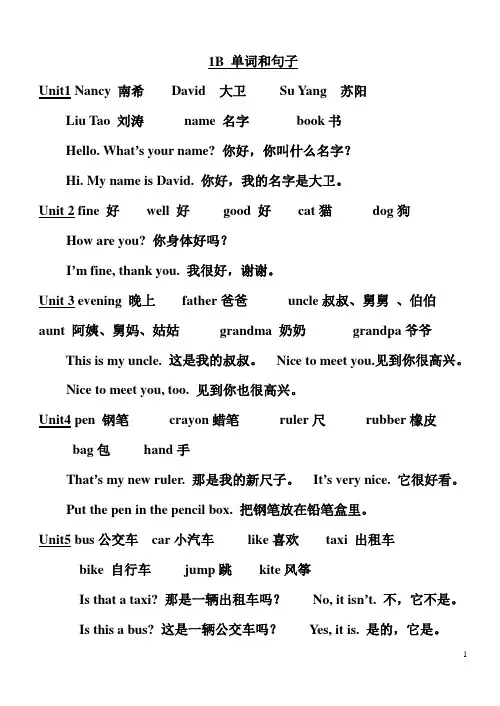
1 1B 单词和句子 Unit1 Nancy 南希 David 大卫 Su Yang 苏阳 Liu Tao 刘涛 name 名字 book书 Hello. What’s your name? 你好,你叫什么名字? Hi. My name is David. 你好,我的名字是大卫。 Unit 2 fine 好 well 好 good 好 cat猫 dog狗 How are you? 你身体好吗? I’m fine, thank you. 我很好,谢谢。 Unit 3 evening 晚上 father爸爸 uncle叔叔、舅舅 、伯伯 aunt 阿姨、舅妈、姑姑 grandma 奶奶 grandpa爷爷 This is my uncle. 这是我的叔叔。 Nice to meet you.见到你很高兴。 Nice to meet you, too. 见到你也很高兴。 Unit4 pen 钢笔 crayon蜡笔 ruler尺 rubber橡皮 bag包 hand手 That’s my new ruler. 那是我的新尺子。 It’s very nice. 它很好看。 Put the pen in the pencil box. 把钢笔放在铅笔盒里。 Unit5 bus公交车 car小汽车 like喜欢 taxi 出租车 bike 自行车 jump跳 kite风筝 Is that a taxi? 那是一辆出租车吗? No, it isn’t. 不,它不是。 Is this a bus? 这是一辆公交车吗? Yes, it is. 是的,它是。 2
Unit6 bee蜜蜂 bird鸟 kite风筝 balloon气球 mouth嘴巴 nose鼻子 What’s that? 那是什么? It’s a bee. 是一只蜜蜂。 Unit7 open the door开门 close the window关窗 stand up 起立 sit down坐下 mango芒果 pig猪 queue排队 Open the door, please. 请开门。 All right. 好的。 Unit 8 swim游泳 skate 溜冰 play football 踢足球 play chess下棋 run 跑 star 星星 What can you do? 你会干什么? I can swim. 我会游泳。 Can you swim? 你会游泳吗? Yes, I can. 是的,我会。 Unit 9 one一 two 二 three 三 four四 five五 six六 seven七 pupil小学生 window 窗户 Happy birthday! 生日快乐! Thank you. 谢谢。 How old are you? 你几岁了? I’m seven. 我7岁了。 Unit 10 park 公园 zoo动物园 cinema电影院 box 盒子 yoyo溜溜球 Let’s go to the park. 让我们去公园吧。 OK. 好的。 OK. = All right.
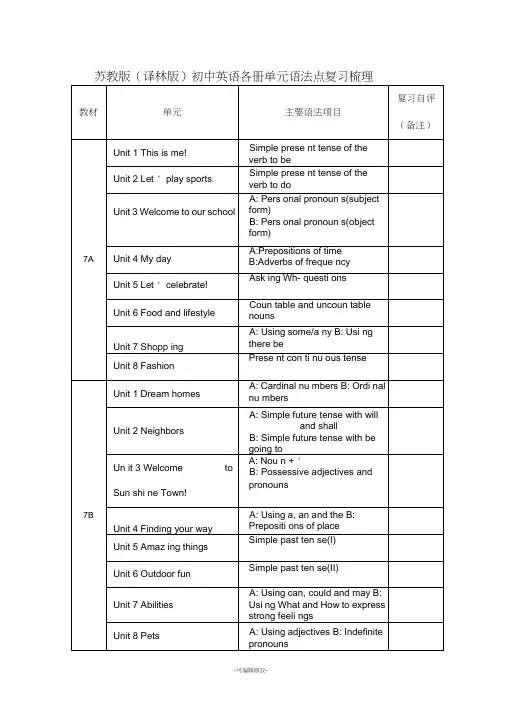
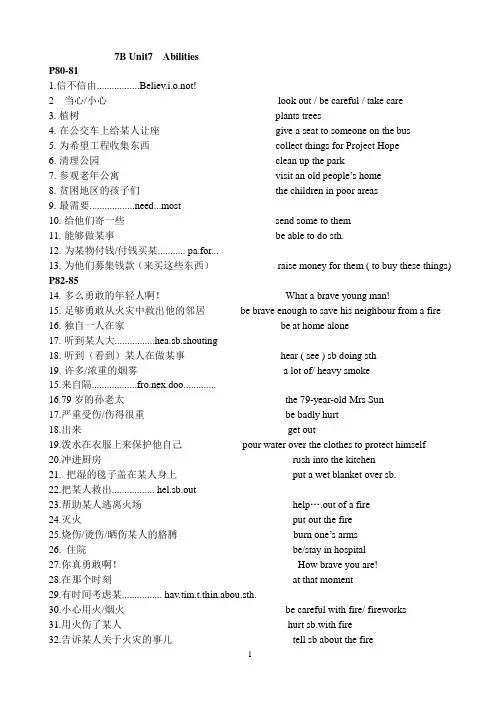
7B Unit7 AbilitiesP80-811.信不信由.................Believ.i.o.not!2 当心/小心look out / be careful / take care3.植树plants trees4.在公交车上给某人让座give a seat to someone on the bus5.为希望工程收集东西collect things for Project Hope6.清理公园clean up the park7.参观老年公寓visit an old people’s home8.贫困地区的孩子们the children in poor areas9.最需要..................need...most10.给他们寄一些send some to them11.能够做某事be able to do sth.12.为某物付钱/付钱买某........... pa.for...13.为他们募集钱款(来买这些东西)raise money for them ( to buy these things) P82-8514.多么勇敢的年轻人啊!What a brave young man!15.足够勇敢从火灾中救出他的邻居be brave enough to save his neighbour from a fire16.独自一人在家be at home alone17.听到某人大................hea.sb.shouting18.听到(看到)某人在做某事hear ( see ) sb doing sth19.许多/浓重的烟雾 a lot of/ heavy smoke15.来自隔..................fro.nex.doo.............16.79岁的孙老太the 79-year-old Mrs Sun17.严重受伤/伤得很重be badly hurt18.出来get out19.泼水在衣服上来保护他自己pour water over the clothes to protect himself20.冲进厨房rush into the kitchen21. 把湿的毯子盖在某人身上put a wet blanket over sb.22.把某人救出................. hel.sb.out23.帮助某人逃离火场help….out of a fire24.灭火put out the fire25.烧伤/烫伤/晒伤某人的胳膊burn one’s arms26. 住院be/stay in hospital27.你真勇敢啊!How brave you are!28.在那个时刻at that moment29.有时间考虑某................ hav.tim.t.thin.abou.sth.30.小心用火/烟火be careful with fire/ fireworks31.用火伤了某人hurt sb.with fire32.告诉某人关于火灾的事儿tell sb about the fire33.听到某人呼................ hea.sb.shouting.calling/cryin.fo.help34.听到关于某人的消息hear the news about sb.35.在报纸上in the newspaper36.着火be on fire37.变得更好get better38.玩火柴play with matches39.不要把任何烫的东西放到垃圾桶里Don’t put anything hot into the rubbish bin.40.让你的头发远离火。
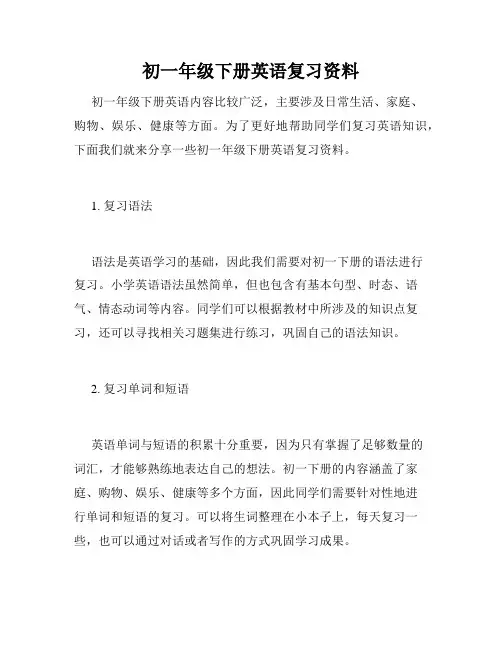
初一年级下册英语复习资料初一年级下册英语内容比较广泛,主要涉及日常生活、家庭、购物、娱乐、健康等方面。
为了更好地帮助同学们复习英语知识,下面我们就来分享一些初一年级下册英语复习资料。
1. 复习语法语法是英语学习的基础,因此我们需要对初一下册的语法进行复习。
小学英语语法虽然简单,但也包含有基本句型、时态、语气、情态动词等内容。
同学们可以根据教材中所涉及的知识点复习,还可以寻找相关习题集进行练习,巩固自己的语法知识。
2. 复习单词和短语英语单词与短语的积累十分重要,因为只有掌握了足够数量的词汇,才能够熟练地表达自己的想法。
初一下册的内容涵盖了家庭、购物、娱乐、健康等多个方面,因此同学们需要针对性地进行单词和短语的复习。
可以将生词整理在小本子上,每天复习一些,也可以通过对话或者写作的方式巩固学习成果。
3. 复习听力听力是英语学习中重要的技能之一,初中阶段就要开始加强听力能力的训练。
初一下册英语教材中包含了很多的听力材料,同学们可以选择跟着教材的音频进行练习,也可以找一些听力练习题进行巩固。
在做听力练习的过程中,同学们应该时刻注意听力技巧的训练,如单词边听边看、细听语音语调等。
4. 复习口语练习口语是英语学习中最重要的环节,因为只有通过口语交流,才能真正地掌握英语语言。
初一下册英语教材中包含了很多交际对话,同学们可以模仿对话进行学习,也可以找一些英语口语练习应用软件进行练习。
在练习口语时,同学们应该注重语音语调、语法和词汇使用等方面的训练。
5. 复习写作英语写作是初中英语教学的重点,初一下册的英语教材中也有很多写作练习。
同学们要针对性地进行写作练习,可以从家庭、购物、娱乐等方面入手,写出简单但又能表达自己意思的文章。
在写作训练中,同学们应该注重语法和单词使用的正确性,掌握基本的写作格式和表达方式。
综上所述,初一年级下册英语复习涵盖了语法、单词、听力、口语、写作等多个方面,同学们需要系统地进行复习,掌握有效的复习技巧。
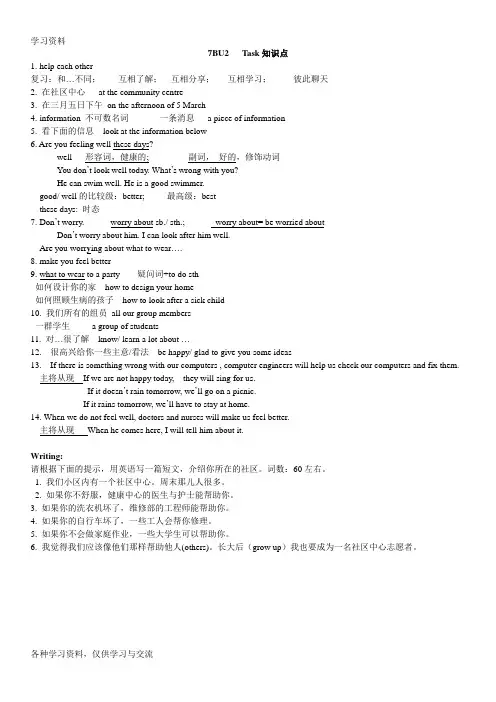
学习资料各种学习资料,仅供学习与交流7BU2 Task知识点1. help each other复习:和…不同;互相了解;互相分享;互相学习;彼此聊天2. 在社区中心at the community centre3. 在三月五日下午on the afternoon of 5 March4. information 不可数名词一条消息 a piece of information5. 看下面的信息look at the information below6. Are you feeling well these days?well 形容词,健康的; 副词,好的,修饰动词You don’t look well today. What’s wrong with you?He can swim well. He is a good swimmer.good/ well的比较级:better; 最高级:bestthese days: 时态7. Don’t worry. worry about sb./ sth.; worry about= be worried aboutDon’t worry about him. I can look after him well.Are you worr y ing about what to wear….8. make you feel better9. what to wear to a party 疑问词+to do sth如何设计你的家how to design your home如何照顾生病的孩子how to look after a sick child10. 我们所有的组员all our group members一群学生 a group of students11. 对…很了解know/ learn a lot about …12. 很高兴给你一些主意/看法be happy/ glad to give you some ideas13. If there is something wrong with our computers , computer engineers will help us check our computers and fix them. 主将从现If we are not happy today, they will sing for us.If it doesn’t rain tomorrow, we’ll go on a picnic.If it rains tomorrow, we’ll have to stay at home.14. When we do not feel well, doctors and nurses will make us feel better.主将从现When he comes here, I will tell him about it.Writing:请根据下面的提示,用英语写一篇短文,介绍你所在的社区。
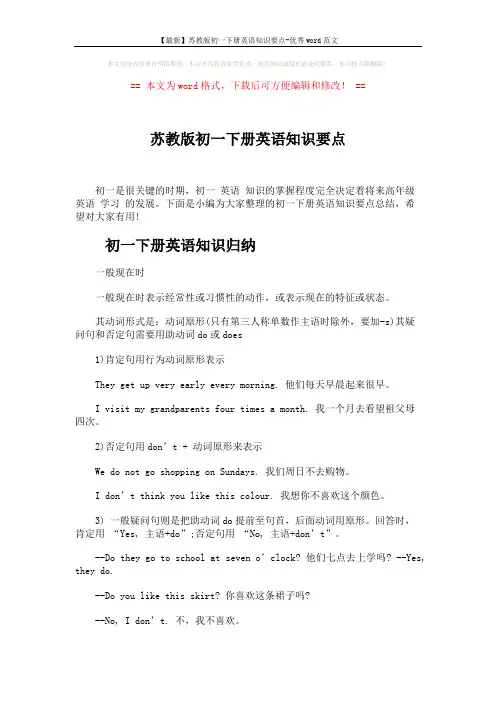
本文部分内容来自网络整理,本司不为其真实性负责,如有异议或侵权请及时联系,本司将立即删除!== 本文为word格式,下载后可方便编辑和修改! ==苏教版初一下册英语知识要点初一是很关键的时期,初一英语知识的掌握程度完全决定着将来高年级英语学习的发展。
下面是小编为大家整理的初一下册英语知识要点总结,希望对大家有用!初一下册英语知识归纳一般现在时一般现在时表示经常性或习惯性的动作,或表示现在的特征或状态。
其动词形式是:动词原形(只有第三人称单数作主语时除外,要加-s)其疑问句和否定句需要用助动词do或does1)肯定句用行为动词原形表示They get up very early every morning. 他们每天早晨起来很早。
I visit my grandparents four times a month. 我一个月去看望祖父母四次。
2)否定句用don’t + 动词原形来表示We do not go shopping on Sundays. 我们周日不去购物。
I don’t think you like this colour. 我想你不喜欢这个颜色。
3) 一般疑问句则是把助动词do提前至句首,后面动词用原形。
回答时,肯定用“Yes, 主语+do”;否定句用“No, 主语+don’t”。
--Do they go to school at seven o’clock? 他们七点去上学吗? --Yes, they do.--Do you like this skirt? 你喜欢这条裙子吗?--No, I don’t. 不,我不喜欢。
一般现在时用来表示经常的或习惯性的动作,常与以下的时间状语连用:often 经常,always 总是,sometimes 有时,usually 通常,every day/ week 每天/ 周等。
He usually goes to school by bike. 通常他骑车上学。
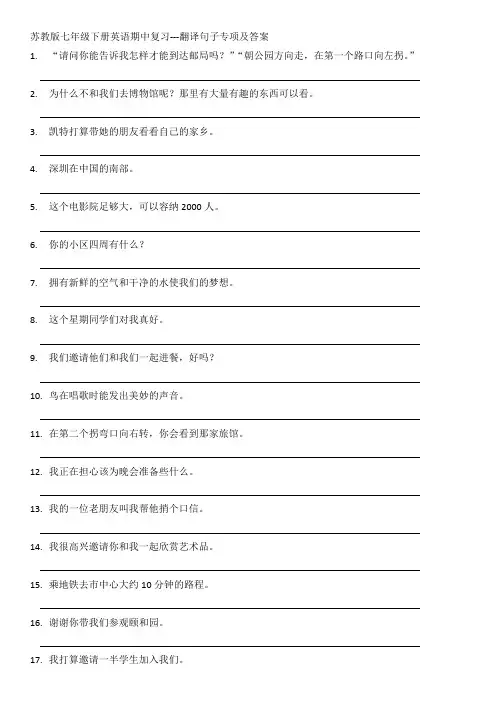
苏教版七年级下册英语期中复习---翻译句子专项及答案1.“请问你能告诉我怎样才能到达邮局吗?”“朝公园方向走,在第一个路口向左拐。
”2.为什么不和我们去博物馆呢?那里有大量有趣的东西可以看。
3.凯特打算带她的朋友看看自己的家乡。
4.深圳在中国的南部。
5.这个电影院足够大,可以容纳2000人。
6.你的小区四周有什么?7.拥有新鲜的空气和干净的水使我们的梦想。
8.这个星期同学们对我真好。
9.我们邀请他们和我们一起进餐,好吗?10.鸟在唱歌时能发出美妙的声音。
11.在第二个拐弯口向右转,你会看到那家旅馆。
12.我正在担心该为晚会准备些什么。
13.我的一位老朋友叫我帮他捎个口信。
14.我很高兴邀请你和我一起欣赏艺术品。
15.乘地铁去市中心大约10分钟的路程。
16.谢谢你带我们参观颐和园。
17.我打算邀请一半学生加入我们。
18.他将走另一条路线去镇中心吗?19.不要害怕见到那些穿制服的警察。
他们很友善。
20.我叔叔打算在农场养一些奶牛并种植一些小麦。
21.我期待着能带你参观我美丽的家乡。
22.什么时候在这条河上将会有一座桥?23.我总是请我的父母不要过多担心我的学习。
23.我肯定他能成为一名很好的艺术家。
24.你的冰箱是不是有毛病?25.他足够勇敢把邻居从火场中救出来。
26.骆驼没有水能活很长时间。
27.警察正在那个房间搜寻那个拜访者。
28.我把我的手机忘在家里。
29.不要喂金鱼太多的食物。
30.在交通灯处我走哪条路到医院?31.你应该让你的女儿远离那个坏男孩。
32.如果我们为他们筹集更多的钱的话,他们将能去上学。
33.我的父母将为我们准备食物和饮料。
34.狮子是动物之王。
35.我的新家在北京市中心。
36.我们期盼着很快见到你们。
37.我的表妹再也不害怕蛇了。
38.为什么不参观一下当地的剧院呢?39.经理的电脑出故障了吗?40.你到家时,记得给我们回个电话。
41.Jack住在一个离市中心30英里的镇上。
42.如果你想了解中国的历史,明天我将带你参观一些博物馆。
初一下册英语复习资料初中一年级的英语课程是培养学生对英语语言基本要素的了解和运用能力的重要学习阶段。
在初一下册英语的课程中,学生们需要掌握基本的语法和词汇,并逐步提高阅读、写作、听说、翻译等语言综合能力。
以下是初一下册英语复习的一些资料建议,希望能帮助到即将迎来中考的初一学生。
一、语法部分初一下册英语课程中,语法部分主要包括现在时态、一般疑问句、there be句型、数量词、代词、人称代词等基本语法要素。
因此,建议学生在复习时先关注这些基础语法,加强语法基础的学习。
二、词汇部分初一下册英语课程中,词汇丰富而有趣,如动物、水果、食品、家庭成员、交通工具、天气和节日等主题词汇。
学生可通过单词卡、语境学习、小组合作等方式来学习并强化记忆。
三、阅读部分初一下册英语课程中,阅读是重点之一,学生需要通过阅读短文和文章来提高英语阅读能力。
因此,建议学生在复习时多读英语原版读物、新闻,逐步提高阅读能力。
四、写作部分初一下册英语课程中,写作主要包括短文、书信、日记等多种类型。
学生可以通过多写、多练,提高文字表达能力,并且经常检查所写文章的语法和语义。
五、听说部分初一下册英语课程中,听说是使学生在语言环境中提高语言交际能力的重要内容。
学生可以通过听英语原版音乐、影视作品、英语口语练习等方式来提高英语听说能力。
六、其他部分初一下册英语课程中,还包括一些翻译、听力填空等技能训练。
这些技能的掌握需要多练习,培养学生的英语思维和语言综合能力。
综上所述,初一下册英语课程是学生提高英语语言水平的基础阶段,重点是打好语法和词汇基础。
学生在复习时可以选择制作复习卡片、制作优秀作品、跟着原版读物读等方法进行有效提高。
通过多角度、多层面的复习提高,期待能帮助学生提升他们的英语水平,为未来的学习打下坚实的基础。
7 B 单词Unit 11.皇宫2.紧邻,在...近旁3.镇,城镇4.加拿大5.法国6.日本7.俄罗斯8.英国9.伦敦10.国家11.首都12.英里13.公寓,套房14.中心15.起居室,客厅16.合用,分享17.与某人合用/分享某物18.卧室19.自己的20.浴室,盥洗室21.阳台22.海滩23.海24.餐厅25.零26.百27.千28.百万29.英尺30.平方的31.米,公尺32.面积33.超过34.叉,餐叉35.冰箱36.刀37.灯,台灯38.淋浴器,淋雨39.沙发40.录像,视频41.满是42.属于某人自己的43.将来有一天,总有一天44.可以;也许,可能45.消息,音信46.传个话,捎个口信47.回电话48.双的;两倍的49.书房50.机器51.洗衣机52.在…脚下53.地,田54.足球场55.邀请56.停留,逗留1.邻居2.哇,呀3.将,将会4.访问者5.像,类似;…怎么样6.服务员7.街区,居民区8.愿意帮忙的;有用的9.志愿者;义务工作者10.社区11.技能,技巧12.帮助某人解决困难13.问题,难题14.某事,某物15.工程师,技能师16.检查17.损坏了的;破碎的18.某人19.修理20.任何人21.学院22.买东西23.幸运的24.将,将会25.后天26.火27.生火28.经理29.办公室30.办公室职员,上班族31.警察32.邮递员33.公司34.局,所,站35.警察局36.邮政37.邮局38.人39.工作40.年纪较长的41.乘火车/公交车/轮船/自行车42.将来43.艺术家,画家44.听起来45.生病的;恶心的46.布告,通告47.信息48.下面49.更好50.任何事51.为…担心52.设计,构思53.组,群1.我的2.没有什么3.等一会儿4.元(人民币单位)5.罐,听6.比萨饼7.交流学生8.安静的,寂静的9.空气,大气10.新鲜的11.本地的,当地的12.慢跑锻炼13.地铁14.出名的,著名的15.西方的16.歌剧,戏院17.错过,失去18.向前,前进19.很快,不久20.明信片21.钥匙22.环,圈;戒指23.钥匙扣24.你的,你们的25.我们的26.他(或她、它)们的27.她的28.到处,遍及29.笔盒,笔袋30.危险的31.笔盒,笔袋32.金銮宝座33.作品,著作34.艺术品35.绘画,油画36.划(船)37.旅馆38.拥有,所有39.家乡40.有好的41.饲养42.生长,发育;长大,长高43.小麦44.嗅,闻到45.驾驶Unit 41.跟随;仿效2.小路,小径3.不得不,必须4.北,北方5.西,西方6.南,南方7.东,东方8.旅行,旅游9.千米,公里10.红绿灯11.每人,人人12.径直地13.向前移动,进行下去,(电灯等)开14.竹15.整天地16沿着,顺着17.路,道路18.国王19.记得,记住20.危险的21.声音22.森林23.好笑的,滑稽的24.笑,大笑25.长颈鹿26.相当,非常27.脖子.28.(树、菜)叶29.东北方30.桥31.穿过,横过32.笼子,鸟笼33.在……对面;穿过,横过34.在……里面35.在……外面36.在……上面37.在……下面38.指示牌39.在……上面40.长椅41.在另一边,到另一侧42.宝藏43.转弯处44.交通,来往车辆45.应当,应该46.交叉路口47.拐角,街角;角落48.准备49.为…准备…50.大量,充足51.大量,足够52.出口53.银行Unit 51.令人吃惊的,惊讶的2.同一的,相同的3.出生,诞生4.停止做某事(用于比较)倍5.地球6.骨头7.后部,背部8.脂肪9.事实10.和……一样11.通常的,平常的12.照例,像往常一样13.坐下14.突然15.低语,耳语16.灌木丛17.转身,翻转18.任何人19.没有人,无人20.答复,回答21.奇怪的;陌生的22.离开23.迅速地,飞快地24.在……路上25.发生26.每件事,每样事物,一切27.琢磨,想知道;感到诧异28.仔细地,认真地,小心地adv.29.搜查,搜寻,搜索vi.&vt. 30.他自己31.自言自语32.虚弱的,无力的33.(猫叫声)喵34.拾起35.拿起,举起36.吃惊的,惊讶的37.随后,后来38.逃离,跑开39.某人,有人40.以前41.前天42.厘米,公分43.渡渡鸟44.蛇45.骆驼46.蚂蚁47.不多的,少数的48.干的;干燥的49.没有50.害怕51.再也不,不再52.听说,知道53.那天,前几天54.同时55.三维,立体56.粉笔57.三明治58.遍及全世界59.不迟于,在……之前60.每,每一61.至少62.像……一样63.英寸n.64.请求;要Unit 61.户外的2.急忙,匆忙3.快点,赶快4.抱怨5.那么,那样6.野营7.骑自行车运动8.骑马9.溜冰10.骑(马、自行车等)11.在外面12.兔,家兔13.洞14.在……旁边,靠近15.经过;通过16.经过17.哎呀,天哪,啊18.手表18.站起身,起立19.逃脱;离开20.落下,掉落;倒21.到达;击中22.她自己23.独自,单独24.低的,矮的25.锁上的26.注意,察觉27.到…里面28.侧,边29.穿过,通过30.通过31.使惊奇,使措手不及32.搭,竖立33.帐篷34.木头,木材35.一段时间,时期36.朝代,王朝37.世纪,百年38.意大利的39.省40.从那时起41.激动的42.手机43.一点,少许44.甜的45.开始变得,变成46.足够地,充分地47.决定48.进入49.向,朝50.忘记.51.太…而不能…52.伸手(脚)够到53.爬,攀登54.失败Unit 71.能力2.相信3.信不信由你4.留神,当心5.座位6.发送;邮寄7.甚至8.能,能够9.付费10.为…付款11.笔记本12.募集13.勇敢的14.救,救助15.从…中救出…16.烟,烟雾17.在隔壁18.严重地,厉害地19.受伤的20.可以,能,会21.倾倒22.保护23.冲,奔24.湿的;未干的;有雨的25.毯子26.消防员27.扑灭28.烧伤;烧.29.住院30.时刻;片刻,瞬间31.点头32.仔细的,认真的;小心的33.使受伤,伤害;疼34.记者35.新闻,消息36.报纸37.火柴38.垃圾,废弃物39.垃圾箱40.吸(烟),抽(烟)41.顺便一下,顺便说说42.照相机43.没问题44.X光,X射线45.学期46.努力地;费力地47.文章48.粗心的49.尽某人最大努力50.钢琴51.做得好52.(well的比较级)较好,更好53.小提琴54.在…岁时55.教;演示;展示56.先生57.女士;夫人58.推荐59.奖;奖品;奖金60.部分61.参加62.(食物、钱等的)短缺,缺乏63.迷失;丢失64.迷路65.到…为止;在…之前66.收到…的来信67.(用于书信结尾签名前)您忠实的Unit 81.宠物2.粗鲁的,不礼貌的3.金鱼4.老鼠,耗子5.鹦鹉6.膝,膝盖7.握住,拿8.喂,喂养9.教10.诗歌11.充分地12.寻找,搜寻;打猎13.藏,隐藏14.建造,建筑15.营地;阵营16.树枝,枝条;棍,棒17.(狗)吠,叫18.咬19.打仗(架);与…打仗(架)20.照顾21.到…时,直到…为止22.终止;末尾,终点23.麻烦24.吐泡泡25.温柔的26.触摸,碰27押韵28.照料,照顾29.照顾30.任何地方31.重复32一直,总是33.同意;应允34.养,饲养35.重;有…重36.克37.成长;长大成人38.讲座;演讲39.声音,响声;噪音40.刷;擦41.(动物的)软毛,毛皮42.(动物的)爪43.篮子44.吵闹的,嘈杂的。
词形变化: 1.I heard you were sick,Are you feel ___(well)now? 2.run quickly look carefully careful careless (care) 3.different ____(able) a teacher of great ___(able) 4.keep the___(match) away from fire. 5.I ___(send) you a letter last week. 6.I saw him __(rush ) into the classroom. 7.She did many thing__(protect)himself. 8.My dad ___(pay) me 3yuan,because I helped him do some work. 9.—(吸烟)is bad for our health. 10.An 8-year-old girl __(迷路) her way and ___(cry)last week. 11.The fire ___(烧伤)himself。 12.Everyone_____(意识)her when she came in. 13.The door was ___(锁着的)。 14.Please knock on the door before you___(进入)the room. 15.The Blacks_____(have) dinner now. 16.They ___(be) afraid to see a snake yesterday. 17.I___(show )you around my hometown when you get here. 18.She isn't tall enough____(reach)the book. 19.I ___(learn)English when I was a little girl. 20.Don't stop __(walk),before you find the place. 21.If you work harder,you will get___(good) grades in your studies. 22.Who ___(think)of the idea? ----Jim is. 23.Sandy often ___(fly) to England when she worked in China. 24.When ___she___(get) there? ---In 3 hours. 25.We ___(stay) at home yesterday. 26.Can you ___(够着) the book ? 27.He didn't swim across the river successfully?--No,he__(失败)at last. 28.Where ___(be) you last night. 29.Open your window,please.--Pardon?I __(not hear) what you said. 30.Dad ___(nod) his head when he was listening to my mum. plan to do sth 计划做某事 practise doing sth 练习做某事 be badly hurt 严重受伤 look for sth 寻找某物 on one‘s way home (to school/work) 在某人回家的路上 pick sth up 把某物捡起来 go out alone 单独出去 rush into 冲进 give a seat to someone 给某人让座 run away quickly 快速逃走 keep ...away from 让...远离.. sound/taste good 听/尝起来好 on fire 着火 in hospital 住院 spend ...on/doing 在...花费 enough time 足够时间 good enough 足够的好 play the violin 拉小提琴 at that moment 在那时 the children in need 有需要的孩子 an 80-year-old man 一个80岁的老人 hear /see/watch/ sb do/doing 听/看..做.. work more ,speak less 多工作,少说话 put out the fire 扑灭火 be careful with sth 小心使用... send sth to sb 发送...给某人 raise money for 捐钱给... pay for 为...支付 hear from sb 收到某人来信 is...enough to do sth 足够怎样做某事 lose one's way 迷路 be able to 能够 buy (bought) sth for sb 为某人买... have no time to do sth 没有时间做某事 stop to do /doing 停止做某事 remember to do /doing 记得做某事 protect oneself 保护自己 burn(burnt )his arms 烧伤胳膊 nod (nodded)his head 点头 too...to... 太...而不能... fall (fell) down 摔跤 bring (brought) sth to sb 给某人带... leave(left) sth at home 把...落在家里 as fast as sound 像声音一样快 complain/talk too much 抱怨/说话太多 without having a rest 没有休息 the other day 第二天 be surprised to do sth 做某事惊奇 pass by 经过 put up a tent 搭建帐篷 a new way to do sth 做...一种新办法 be different from/between 与...不同 be famous for 由于...而著名 ride to... 骑车去... enter the room 进入房间 speak a little French 会说一点法语 walk across the road 过马路 decide to do 决定做某事 go through the door 穿过大门 run after 追赶 what a heavy snow 好大雪 get the /an award 获奖 anything dangerous 任何危险的东西 a one-year-old baby 一个1岁的婴儿 how soon 多久之后 different abilities 不同的能力 do/try one's best to do sth 尽力做某事 visit an old people's home 拜访敬老院 典型翻译 1.我们经常筹钱去帮助有需要的孩子们。 We ofen raise money to help the children in need. 2.你能参加今晚的聚会吗? Can you take part in the party this evening? 3.我陪这个小孩玩了1个小时,在他父母来之前。 I played with the little boy for 2 hours. 4.5岁的小男孩昨天迷路了。 The 5-year-old boy lost his way yesterday. 5.我期待收到你的来信。 I look forward to hearing from you . 6.她足够小不能够着桌子上的书。 She is small enough to reach the book on the desk. 7.我看到老师走进教室了。 I saw the teacher walk into the classroom. 8.警察们跑过那个田地追赶那个坏人。 The policemen ran across the field after that bad man. 9.当你3岁时,你会穿衣服吗? Can you dress yourself when you were 3. 10.这花看起来多美啊! How beautiful the flower looks ! 11.她昨天过马路时摔跤了。 She fell down when she crossed the road yesterday. 12.你们尽力学英语了吗? Did you try your best to learn English? 13.他在森林里迷路了。 He lost his way in the forest. 14.让孩子远离大火。 Keep the children away from big fire. 15.多么令人激动的消息啊! What exciting news it is! 16.她十岁就会拉小提琴了。